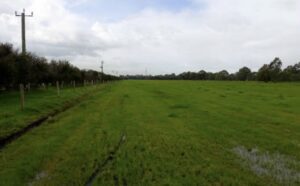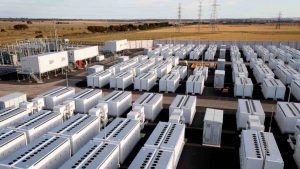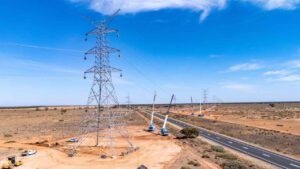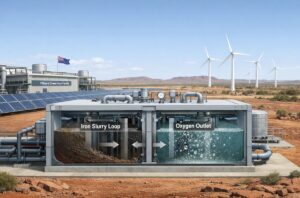Australia’s first community-owned energy retailer, the Byron Bay-based Enova Energy, has been forced into voluntary administration, a victim of the ongoing crisis in the National Electricity Market fuelled by the soaring cost of fossil fuels.
Administrator Simon Cathro, from Cathro Partners, was appointed on Tuesday, according to an ASIC notice, with a first creditors meeting scheduled to be held on June 30. Enova had more than 13,000 customers which could be switched to another retailer under the regulator’s “retailer of last resort” mechanism.
The news comes less than one week after the Australian Energy Market Operator took the unprecedented step of suspending the operation of the NEM’s wholesale spot market, declaring it “impossible to operate” under what were increasingly chaotic pricing and supply conditions.
The extended high wholesale price conditions, which continue under the suspension order, have been particularly tough on small retailers, many of which have been shedding customers and even asking them to move to other suppliers to avoid paying up to 100% more for their power.
There have been fears about the future of small retailers in the face of unrelenting high prices, and Enova is the highest profile victim to data.
In a statement on Tuesday, Enova managing director and CEO Felicity Stenning said the “current diabolical state of the energy market,” combined with high wholesale energy prices and the cap on customer pricing had made it “impossible” for the company to operate in the market.
“The market is broken and does not support small retailers,” Stenning said. “In addition, the constant raft of state and federal government regulatory changes is adding to the market complexities and have caused Enova delays in being able to fund and resource energy innovation.
“We are very supportive of the Labor government’s fast action and current review of the energy markets. However, there needs to be greater emphasis on the plight of retailers.”
John Taberner, chair of Enova Community Energy, said the east coast energy crisis was a matter of national significance that needed the urgent attention of government and regulators.
“The Enova board’s decision to enter voluntary administration has not been taken lightly and comes as a result of the organisation being extremely challenged in recent months … specifically the previously unseen activity on the wholesale energy market including severe and sustained wholesale electricity pricing,” Taberner said.
Headquartered in Byron Bay, Enova signed up its first customer in May, 2016. Within three years it had gathered more than 1600 shareholders, created more than 20 jobs in the Northern Rivers region.
At the time of its voluntary administration, it serviced 13,200 customers across New South Wales and south-east Queensland.
It was focused on a 100 per cent renewable energy future, and did not invest in coal, oil or gas, but rather focused on helping communities become energy independent using their own supplies, mostly via rooftop solar.
To this end, Enova reinvested 50% of its profits into community-owned renewable energy projects, energy efficiency, and energy education services via its not-for-profit arm, Enova Community – the company said on Tuesday that this part of the business would continue to operate.
Enova has won numerous awards, including Canstar Blue’s Green Excellence Award for energy in 2022 and number one rating in the 2022 Green Electricity Guide by Greenpeace.
In 2017, the last time Australia’s wholesale electricity prices saw a significant jump, Enova publicly hit out at the greed of some of the country’s fossil fuel generators and their “gaming” of wholesale market prices, which at that time caused Enova to lift its consumer bills by around 20 per cent.
“We are deeply disturbed by the greed of a few fossil fuel generators,” Enova’s then CEO Steve Harris said in a letter to customers at the time.
“This, together with a lack of government policy around future renewable energy targets has resulted in a major market failure for which electricity consumers are having to pay a heavy price.”
The company also wrote a blog post that highlighted the bidding practices of generators and their gaming of the markets, which then – as it has to some degree now – caused wholesale prices to soar.
“It’s been widely known in the industry for a long time that a certain amount of ‘gaming’ goes on which drives prices up – which under current market rules is completely legal, even though it’s not in the best interests of the consumer,” the blog said.
Just this week, Enova’s former chair, Alison Crook – who played a major role in steering the company through its first six years, before stepping down from the role late last year – wrote to state and federal energy ministers warning that small retailers were at risk of being eliminated from the market.
“If governments do not address this issue, then by the end of the crisis there will be few if any small retailers left and the government will not be able to rely on market competition to help drive or keep prices down,” Crook wrote.
Among a series of recommended reforms to the market to support small retailers, Crook called for the declaration of a Temporary Energy Supply Crisis Period – a package of measures to assist the market to operate, and avert the worst consequences of an unmitigated market, especially for household and business consumers.
“Within this framework measures might be taken to support small retailers and ensure their continued role in the transition to renewables,” Crook said.
Adrian Merrick, the founder and CEO of Melbourne-based small retailer, Energy Locals, said that managing risk was part of the job for retailers, but that these risks were currently asymmetric.
“This makes it challenging for many, especially those that are early-stage,” Merrick told RenewEconomy. “For example, the market operator ignores all hedges that are in place for four weeks prior to settlement. This creates a cashflow requirement that can drain a company’s ability to survive in some cases.
“Losing Enova to this current mess is a real shame,” Merrick added. “They had good passion and a great green focus.
“I hope we can work with some of the Enova team and their customers in some way to continue the good work they started.”








